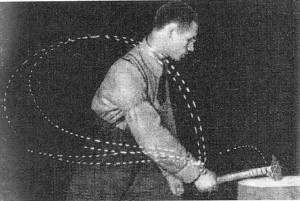Though the poet Aleksei Gastev was killed during Stalin’s Great Purges, he had been a Communist supporter for much of his life. Though he was distanced from the Party in 1907, when he was in his late twenties, after a disagreement on how to combat the spread of capitalism, he still supported the proletariat in a variety of ways. Gastev’s intention in “We Grow out of Iron” can be better understood if we consider his strong belief in unions, which was the basis of his break from the Party.
The use of strong “pro-labor” phrasing in this piece could be easily interpreted as contributing to an early piece in the Socialist-realism movement, not fully popular until the 1930s. The way he glorifies progress also seems to allude to his socialist tendencies.
Of particular interest in this piece is Gastev’s use of personal pronouns. The poem separates the narrator form other characters in the piece through its use of “I’ and “They”. One of the conflicts in this poem comes from the narrators interaction with the building, with the “they”. This “iron structure” (ln. 6) is given qualities associated with the early Soviet movement in the USSR– “They are bold, they are strong./ They demand yet greater strength.” (Ln. 7-8). This piece is Gastev’s argument for the future of the Communist state. He believes that through unionization of the proletariat they can organize labor for themselves better than a distanced administration. The unions, Gastev assrets, can “[force] the rafters, the upper beams, the roof…higher.” (ln. 14-19), that they could have propelled the Soviet Union forward. But, the labor would have had to be organized by the workers, by these groups grown out of the population. This is most evidenced by the Gastev’s opening line, “I stand among workbenches, hammers, furnaces, forges, and among a hundred comrades.”
